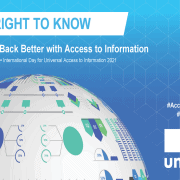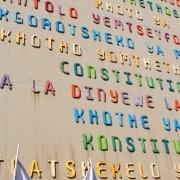|
Getting your Trinity Audio player ready...
|
My Vote Counts (MVC) has embarked on the next step in its fight for transparency in political party funding in South Africa.
The organisation is advocating for complete transparency and reform of the funding of all political parties, making it mandatory for all parties to disclose where their money is coming from, thereby giving all citizens the chance to make a truly informed decision about where to put their mark. In February 2015 the organisation approached the Constitutional Court, asking it to direct Parliament to urgently pass legislation that will ensure this disclosure.
On 30 September 2015 the court ruled against the bid. The organisation then issued requests to the 13 political parties represented in Parliament, under the Promotion of Access to Information Act (PAIA), asking them to disclose their sources of private funding.
But by the deadline of 1 July 2016, just four parties had responded – the FF+, the IFP, the AIC and the DA – and then only to say that they would not be disclosing the requested information.
MVC is now applying to the Western High Court for an order in terms of section 172(1) of the Constitution, declaring that PAIA is invalid and unconstitutional and has a number of shortfalls that must be addressed, as it is currently not capable of affording the electorate the information to which they are entitled about the way political parties are funded. “That is a context with unique demands, to which PAIA does not address itself,” MVC says.
Read MVC’s latest press statement below:
MVC statement on launching of litigation
INTRODUCTION
MVC believes that every vote counts. And we believe it must count more than the rands and cents that political parties collect in order to campaign for public office. When individuals, or companies, or foreign governments make financial donations to political parties, and they become more important than the common voter, or where their voice is heard louder and taken more seriously than yours and mine, democracy is in danger. We refuse to let our hard won democracy be reduced to the economic principle of one rand, one vote. Our democracy will not be put up for sale to highest bidder.
That is why we believe that every cent received by a political party in order pursue a public promise must be accounted for to the public. It is a simple equation: if you stand for citizens under the Constitution, you will stand accountable to citizens under the principles of the Constitution.
We know that political parties receive money from public and private sources. However, the law deals differently with the two types of funding.
No legislation requires systematic and proactive disclosure of private funding of political parties. Public funding, by contrast, has already been dealt with in legislation. Parliament passed this legislation in 1997 when it enacted the Public Funding of Represented Political Parties Act. This is despite the fact that private funding is estimated to outweigh the receipt of public funds considerably.
MVC seeks to change this position.
The founding premise of our case is the special role of political parties in our constitutional democracy. They are in the words of the Constitutional Court, “the veritable vehicles the Constitution has chosen for facilitating and entrenching democracy”.
The flow of funds to political parties, whether public or private, is inextricably tied to their pivotal role in our country’s democratic functioning. The public can only properly hold their elected representatives accountable if they are sufficiently informed of the relative merits of the issues at stake. We therefore believe that the right to vote for a political party is a right to cast an informed vote.
Does this include knowing the private sources of political parties’ funding? We believe it does.
This belief is based on what the Constitution says about access to information and the nature of the political rights we enjoy.
MVC’S LITIGATION
In light of this constitutional provisions, we originally sought an order from the Constitutional Court in 2015 compelling Parliament to enact legislation in order to give effect to these rights by to regulating the disclosure of private funding information. This legislation, it was argued for several reasons, was required in addition to Promotion of Access to Information Act, 2000 (PAIA).
The majority of the Constitutional Court in My Vote Counts v Speaker of the National Assembly [2015] ZACC 31 at 147-148 (My Vote Counts) held that we were wrong on our constitutional interpretation.
The court held that PAIA is the legislation envisaged in terms of section 32(2) of the Constitution, and it was intended fully to give effect to the right of access to information. There was thus no constitutional obligation to create additional legislation. In other words, PAIA is the legislation that gives effect to the constitutional obligation that exists in section 32, and that if MVC feels that citizens cannot get the information they need to exercise their rights, MVC must make a full frontal challenge to PAIA itself.
So that is what MVC is doing?
MVC is applying to the Western High Court for an order in terms of section 172(1) of the Constitution declaring that PAIA is invalid and unconstitutional insofar as and to the extent that it fails to make provision for the continuous and systematic recordal and disclosure of information regarding the private funding of political parties and independent ward candidates (the latter concept as contemplated in section 16 of the Local Government: Municipal Electoral Act, 2000) (independent candidates) registered for elections for any legislative body established under the Constitution (private funding information).
WHAT ARE THE PROSPECTS OF SUCCESS?
Are we correct in our assertion that PAIA is unconstitutional?
The minority judgment in the My Vote Counts case concluded that information about political parties’ private funding is required for the exercise of the right to vote (at paragraph 43). This judgment, in reaching the stated conclusion, commended on the rich and fundamental nature of the right to vote as follows (at paragraphs 41-42):
So the right to vote does not exist in a vacuum. Nor does it consist merely of the entitlement to make a cross upon a ballot paper. It is neither meagre nor formalistic. It is a rich right – one to vote knowingly for a party and its principles and programmes. It is a right to vote for a political party, knowing how it will contribute to our constitutional democracy and the attainment of our constitutional goals. Does this include knowing the private sources of political parties’ funding? It surely does.
It is important to understand that the merits of MVC’s arguments were not considered by the majority of the Constitutional Court because it held that we had come to the wrong court.
We therefore demonstrate in our papers that PAIA is woefully inadequate in respect of providing access to private funding information and does not allow for the continuous and systematic recordal and disclosure of such information to the electorate.
HOW IS PAIA INADEQUATE?
PAIA is not capable of affording the electoral citizenry the information to which they are entitled about the way political parties vying for their votes are funded. That is a context with unique demands, to which PAIA does not address itself.
In brief, PAIA’s shortfalls include the following:
- disclosure under PAIA is not automatic and is triggered only once a request has been made for information;
- disclosures are, at best, limited to the specific information requested at the specific time by a requester;
- only existing records of information are accessible under PAIA, rather than information generally;
- there is no obligation to create records of private funding information;
- there is no obligation to ensure continuous disclosure of private funding information in respect of political parties;
- there is no obligation to maintain records of private funding information or penalties for their destruction; and
- there are a number of grounds on which access to records may be refused, which are inconsistent with the Constitution in respect of the disclosure of private funding information.
Information that is unrecorded, such as oral communications, and information which can only be gained through access and greater transparency, such as by allowing the physical presence of observers to witness certain meetings, is not accessible under PAIA.
This means the complete loss of, inter alia, the following forms of information:
- phone conversations and other verbal communications between political parties and funders;
- identity and source of funds received from donors, no matter the size or provenance of the donation, – internal party discussions regarding funders;
- the creation and cancellation of oral agreements between political parties and funders to provide funding; and
- “cold calls” and other unrecorded approaches made by political parties to obtain funding.
At a fundamental level, PAIA also only gives access to records that are held by public or private bodies, and nothing in between.
There is furthermore no provision in PAIA, which would allow access to information from foreign donors.
CONCLUSION
On 31 May and 1 June 2016, MVC submitted various “request for information” forms (“the 2016 PAIA requests”) to the various political parties currently represented in Parliament under section 53(1) of the PAIA.
The 2016 PAIA requests requested each political party to furnish the applicant with, inter alia, a full record of all monetary donations received from private sources, including individual persons (local and foreign), companies (local and foreign), and foreign governments. The above-mentioned information had to account for the previous five years and include the following particularity: (i) the date on which the funds were received; (ii) the amount received; (iii) the name of the funder; and (iv) whether there were any conditions attached to the donations and, if there were, to specify what they were.
The statutory deadline for the relevant political parties to respond to the 2016 PAIA requests was 1 July 2016.
Every single party refused to provide any of the information sought in the 2016 PAIA requests.
This is not the first time that MVC has encountered this kind of response on behalf of political parties.
We know that PAIA is inadequate.
This is why we are proceeding to court.
• Issued by My Vote Counts, 28 July 2016








